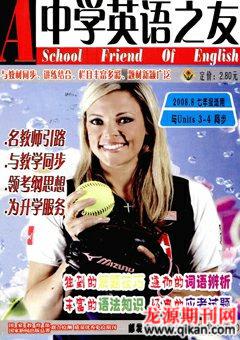新目标七年级(上)Units3-4词语辨析
段瑞敏
Unit 3
1. home, house, family
这三个词均表示“家”之意,但它们的用法却不同:
home指一个人出生和居住的地方,它不涉及家庭的组成成员,而强调人们所生长的环境。例如:
I think Jim is at home. 我想吉姆今天在家。
home还可以用作副词表示“在家、到家”等之意。如:
Lets go home. 咱们回家吧。
house侧重于表示具体的建筑物,意为“家,房子”。例如:
My house is on the hill. 我的家在那座小山上。
family指由祖父母、父母、兄弟姐妹等各个家庭成员所组成的家庭,当其表示家庭的各个成员时则谓语动词应用复数形式;当把family看作一个整体时,谓语动词一般应用单数形式。例如:
Her family is a big one. 她家是一个大家庭。
His family are English. 他全家都是英国人。
巩固精练:用family, home或house填空:
(1)She and her ____ are all in London(伦敦).
(2)Tom goes back ____ at 5:00 in the afternoon.
(3)Im in Beijing now, but my ____ is in Hangzhou and Ill(将) go ____ in a few days(几天后).
(4)There are two big trees in front of our ____.
Key:(1)family (2)home (3)home/family, home (4)house
2. a, an, the
a, an和the都是冠词, a, an是不定冠词,the是定冠词。
(1)不定冠词a/an泛指某一个(类)人或物。其中a用在以辅音音素开头的单数名词前,an用在以元音音素开头的单数名词前。例如:
a book一本书an apple一个苹果
(2)有些单词以辅音字母开头,但这个辅音字母不发音,这时要以单词发音的第一个音素为依据。例如:
an hour 一小时 an honor一种荣誉
(3)有些单词虽以辅音字母开头,但这个辅音字母的读音是元音音素,其前要用an。例如:
an X-ray photograph 一张X光照片
(4)定冠词the用于各类名词前,表示特指,具有“这、那”的意思。例如:
Open the window. 打开窗户。
The book on the bed is Marys. 床上那本书是玛丽的。
巩固精练:用a, an, the填空:
(1)Wang Tao is ____ girl, and Li Ming is a boy.
(2)This is ____ eraser, and that is a ruler.
(3)——Whats this? ——Its ____ notebook.
(4)Look at ____ cap. Its very nice.
Key:(1)a (2)an (3)a (4)the
3. desk, table
desk和table都可以作“桌子”解。desk指供读书、写字、办公用的桌子,一般带抽屉;table则侧重于指供吃饭、喝茶、游戏或其它用途的桌子,通常没有抽屉。
Can you see the teachers desk? 你能看见老师的讲桌吗?
Our football is under the table. 我们的足球在桌子底下。
巩固精练:用desk或table填空:
(1)The children are at the breakfast ____.
(2)He is reading at his ____.
(3)The boys are sitting at a round ____.
(4)The fine four-drawer ____ is mine.
Key:(1)table (2)desk (3)table (4)desk
Unit 4
4. take, bring
(1)take表示把某物或某人从说话人处“带到”或“拿到”别处去,常与to连用,有明显的方向性。例如:
Can you take these books to the classroom?
你能把这些书拿到教室去吗?
(2)bring指从另一处把某物“拿到”或把某人“带到”说话人处。例如:
Dont forget to bring the pictures to me. 别忘了把画给我带来。
You must bring your homework to school tomorrow.
你明天必须把作业带到学校。
巩固精练:用take或bring填空:
(1)Please ____ me a new pencil.
(2)May I ____ this book home?
(3)Next time you come, ____ your daughter.
Key:(1)bring (2)take (3)bring
5. sport, game, play
sport 泛指各种形式的运动和户外活动,可以是娱乐性的,也可是竞争性的体育活动,指娱乐性或锻炼性的体育活动用作不可数名词,指竞赛性体育活动或体育项目时用作可数名词。如:
He loves all kinds of sports. 他喜欢各种运动。
Playing football and running are sports. 踢足球和跑步是体育运动。
game(游戏、运动、比赛),指为娱乐或运动根据某种规则而进行的体力或脑力的比赛,可在室内或室外。指运动时常用复数。如:
The Olympic Games are held every four years.
奥林匹克运动会每四年举行一次。
Lets play a game of chess!我们来下一盘象棋吧!
play(玩耍、游戏),指心灵或体力的休闲活动,泛指无目的、无结果的消遣或娱乐活动。如:
His life is all work and no play. 他的生活只有工作没有娱乐。
The children are playing with a ball. 孩子们在玩球。
巩固精练:用sport, game或play填空:
⑴Our team won(获胜) the ____.
⑵Swimming is a healthful ____.
⑶Im tired. Its time for ____.
Key:⑴game ⑵sport ⑶play/game
6. everyday, every day
everyday是形容词“日常的、普通的、每天的”,用作定语。如:
This is an everyday dress. 这是一套便服。
Lets begin with everyday English. 让我们从日常英语开始学起。
every day是名词词组“每天、天天”,有时也指“一天天地”,作状语。如:
I read English every day. 我每天读英语。
I do morning exercise every day.我每天做早操。
巩固精练:用everyday或every day填空:
⑴I drink a bottle of milk ____.
⑵This is my ____ work.
⑶I go to work ____.
Key:⑴every day ⑵everyday ⑶every day
7. some, any
some用于肯定句,后接可数名词的复数或不可数名词,但在表示建议或请求的疑问句中或想得到对方肯定回答时,一般用some 而不用any。
any 多用于疑问句或否定句中,后接可数名词的复数或不可数名词。
巩固精练:用some或any填空:
(1)Do you have ____ water? Im thirsty.
(2)Do you have ____ brothers and sisters?
Key:(1)some (2)any
8. in bed, on the bed
in bed表示因病卧床或躺在床上,短语中的bed不指具体的某张床,故其不加冠词,in也不能改为on。例如:
Tom is ill in bed. 汤姆卧病在床。
on the/one?蒺s bed 表示“在某张/某人的床上”。例如:
Her skirt is on the bed. 她的裙子在那张床上(放着)。
巩固精练:用in bed或on the bed填空:
(1)He is ____ with a cold (感冒).
(2)She saw (看见) a new red box ____ her ____.
(3)You?蒺re dirty (脏的). Don?蒺t lie (躺) ____ my ____.
Key:(1)in bed (2)on, bed (3)on, bed

